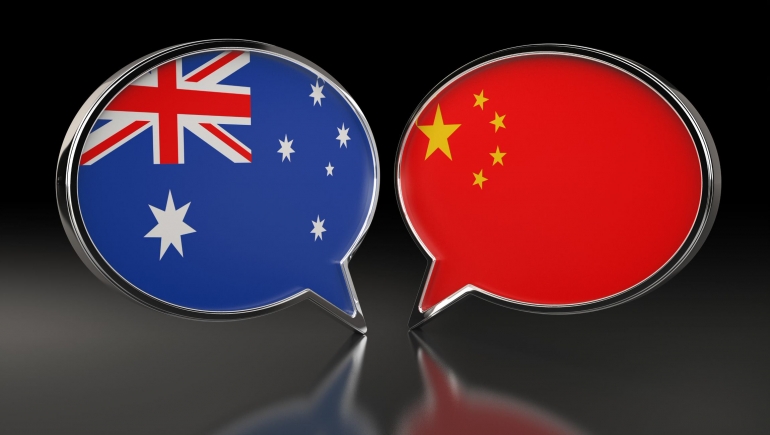Thur 11 June 2020
By Associate Professor Weihuan Zhou
Australia’s relationship with China is on the verge of a historic low after senior government ministers criticised China for lack of transparency in handling the outbreak of the Coronavirus (COVID-19) and pushed for investigations into the origin of the pandemic in Wuhan, China. Australia’s economic recovery after COVID-19, however, requires the broadening and deepening of economic cooperation with China. There is a pressing need for the Australian government to take actions to reinvigorate bilateral relations.
The deterioration of the bilateral relations is not merely a result of misunderstanding
The deterioration of Australia-China relations has resulted from a series of events in which Australia’s reactions were perceived as anti-China and triggered threats of retaliation from its largest trading partner. However, in some of these events, commentaries have exaggerated the situation leading to escalated misunderstandings between the two nations. For example, despite Australia’s support for an independent international inquiry into the cause of the pandemic, Prime Minister Scott Morrison has stressed that there is no evidence to show that the virus originated in Wuhan Institute of Virology and reiterated the significance of the bilateral relationship on many occasions.
In other events, however, criticisms of Australia’s position were not misplaced. For instance, amid the rise of Huawei as a global leader in 5G technology, Australia joined the US to exclude Huawei from its 5G mobile infrastructure based on national security. While Australia’s policy does not explicitly name China, it is widely known to be targeting Huawei or Chinese tech giants like it for fear of security risks associated with the involvement of the Chinese government in commercial activities of these companies. In effect, this policy has caused Australia’s major telecommunication operators to abandon Huawei and partner with non-Chinese firms in building the 5G network, leading to significant impacts on Huawei’s financial performance in Australia. However, Australia’s concern about the influence of the Chinese government is not unbiased as other governments may also have incentives and capacity to influence private entities in ways that pose similar security threats.
Cooperation, rather than decoupling, is the way forward
The two economies will remain highly connected and interdependent after COVID-19, making it neither possible nor wise for Australia to decouple from China. Despite the disruptions in diplomatic relations, the two-way trade in goods and services has grown significantly reaching $235 billion in 2018/19, according to the latest data released by the Department of Foreign Affairs and Trade on 15 April 2020.
China is the world’s largest market for Australian goods and services exports which amounted to $153.2 billion in 2018/19, more than the combined value of Australia’s exports to its 2nd – 6th largest markets, including Japan ($61.7 billion), South Korea ($27.8 billion), the US ($24.7 billion), India ($22.8 billion) and New Zealand ($16 billion).
China’s progressive reform and liberalisation of its foreign investment regime, culminating in the implementation of the new Foreign Investment Law on 1 January 2020, shows a strong commitment to enhancing market access and conditions of competition for foreign investors. This latest overhaul of the foreign investment regime serves China’s longstanding interests in attracting advanced and new foreign technology to promote economic transformation based on innovation. As a global leader in R & D and innovation, Australia has great potential to grow investment in China which currently remains marginal (i.e. $13.5 billion in 2018) compared with China’s investment in Australia (i.e. $40.1 billion in 2018) or Australia’s investment in other major markets (e.g. $120.7 billion (US) and $118.7 billion (UK) in 2018).
Overall, the strong complementarities between the two economies mean that the bilateral economic ties will continue to develop despite the emergence of some political sentiment in the Australian government to disentangle and diversify away from China. While greater diversification is desirable, China will remain an irreplaceable partner in the foreseeable future. It is, therefore, difficult to imagine a significant economic decoupling between the two economies. Rather, cooperation seems to be inevitable and will continue to deliver mutual benefits.
Reinvigorating the bilateral relations requires more than diplomatic actions
Diplomatic actions, such as the appointment of a special PRC envoy, are seen to be a necessary step to break the political impasse. However, these actions will not be sufficient.
Australia needs to take steps to broaden and deepen economic cooperation with China through, inter alia, the review mechanisms embedded in the China-Australia Free Trade Agreement (ChAFTA). In its current form, the agreement does not provide sufficient market access for Australian businesses especially in the services sector which accounts for over 75% of Australia’s GDP. ChAFTA renegotiations should seek to, for example, reduce various regulatory barriers in the professional, financial and education services sectors in China. Particularly, the unparalleled and enduring impact of COVID-19 on Australia’s higher education has amply demonstrated the growing importance of distance and online education. The ChAFTA, however, has not included any relevant obligations leaving room for China to introduce regulatory restrictions on cross-border delivery of education by Australian universities to Chinese students. China’s commitments in this regard will be essential for the successful transition of Australia’s higher education to a global “new normal” in the post-pandemic world. In return, Australia could offer enhanced market access for Chinese exports (including reduced use of anti-dumping measures), investment (including investment facilitation), and temporary workers. Renewed effort to upgrade this landmark deal would not only signal the determination of both governments to strengthen the bilateral ties but would also provide the opportunity for Australia to create first-mover advantages for its businesses, particularly services firms, in the Chinese market.
